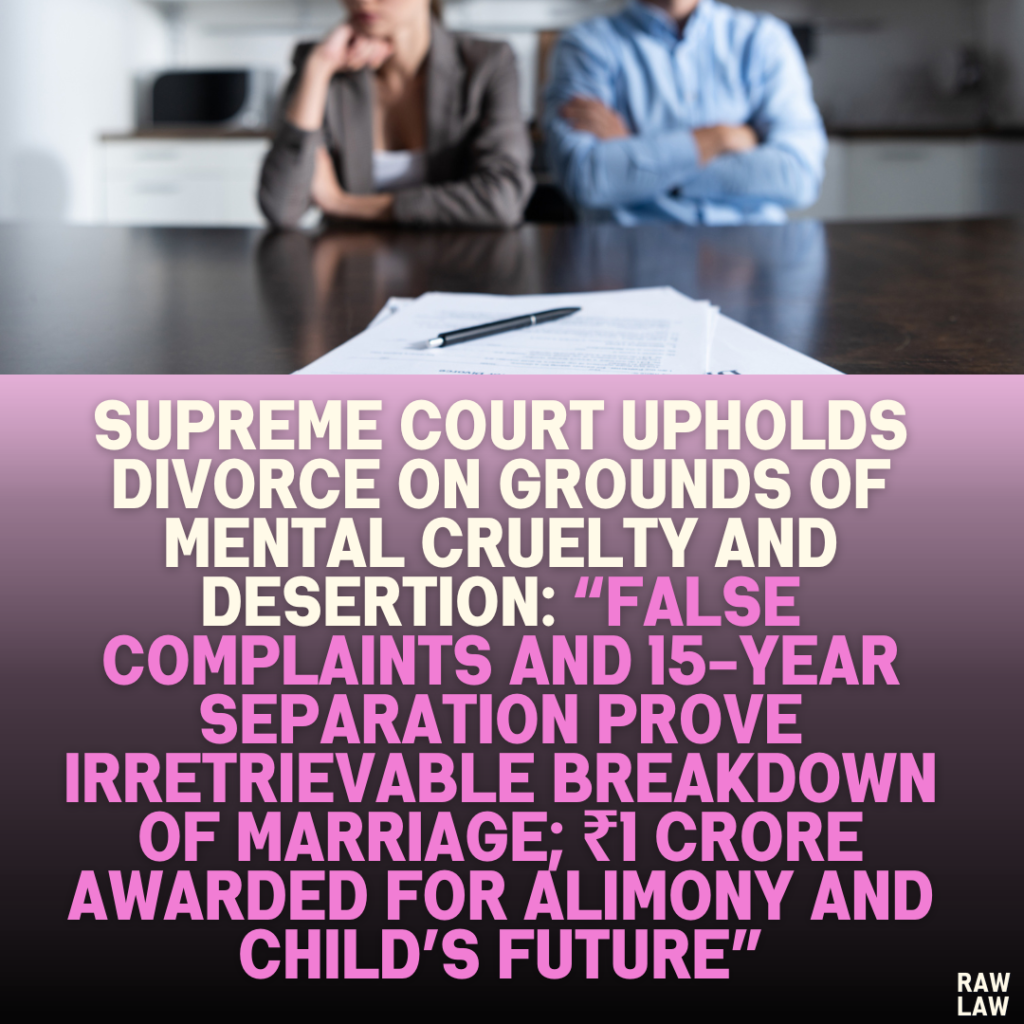Court’s Decision
The Supreme Court upheld the High Court’s judgment granting a decree of divorce in favor of the husband. The Court found that the wife’s conduct—filing false criminal complaints and living separately for over 15 years—amounted to mental cruelty and desertion under Sections 13(1)(ia) and 13(1)(ib) of the Hindu Marriage Act (HMA), 1955. It concluded that the marriage had irretrievably broken down and could not be revived. Additionally, the Court awarded:
- ₹50 lakhs as permanent alimony to the wife.
- ₹50 lakhs for the daughter’s education and future expenses, such as marriage.
The Supreme Court dismissed the appeal filed by the wife, noting that forcing the continuation of a defunct marriage would be unjust and against public interest.
Facts
- Marriage and Initial Cohabitation:
- The appellant (wife) and the respondent (husband) were married in 2002.
- The husband was employed as a software engineer in Punjab, where the wife also joined him after securing employment in the same company.
- The couple lived together for a short period before the wife moved to her parental home for childbirth.
- Separation and Subsequent Legal Proceedings:
- The wife gave birth to a daughter in 2003 and refused to return to the matrimonial home despite the husband’s requests.
- The husband issued a legal notice for reunion in 2003, which led to disputes.
- The wife filed a criminal complaint alleging dowry harassment but abandoned it later.
- Attempts at reconciliation, including a panchayat intervention, failed, and the couple resumed living separately.
- Petitions and Counterclaims:
- The husband filed a petition for divorce in 2010, citing mental cruelty and desertion.
- The wife counterclaimed, seeking restitution of conjugal rights, but did not actively pursue it.
Issues
- Cruelty: Whether the wife’s actions, including filing a false dowry complaint, amounted to mental cruelty under Section 13(1)(ia) of HMA.
- Desertion: Whether prolonged separation without valid cause constituted desertion under Section 13(1)(ib) of HMA.
- Irretrievable Breakdown: Whether the Court could consider the irretrievable breakdown of marriage as a ground for divorce.
Petitioner’s (Wife’s) Arguments
- Jurisdictional Challenge: The High Court overstepped its jurisdiction by reversing concurrent findings of the lower courts under Section 100 of the Code of Civil Procedure (CPC).
- Condonation of Cruelty: The alleged cruelty was condoned when the parties briefly resumed cohabitation in 2004.
- Reconciliation Efforts: The wife expressed willingness to reconcile, while the husband acted in bad faith by deserting her.
- Emotional and Social Impact: The wife opposed the divorce, citing concerns about the stigma of divorce and its impact on their daughter.
Respondent’s (Husband’s) Arguments
- Mental Cruelty: Filing a false dowry complaint caused irreparable harm to his reputation and mental well-being.
- Prolonged Separation: Living apart for over 15 years demonstrated the irretrievable breakdown of the marriage.
- Failure of Reconciliation: The wife showed no genuine intent to reconcile, prolonging the litigation unnecessarily.
- Legal Precedents: The High Court correctly applied principles of cruelty and desertion and invoked irretrievable breakdown under Article 142 of the Constitution.
Analysis of the Law
- Mental Cruelty:
- The Court reiterated principles from Samar Ghosh v. Jaya Ghosh and N.G. Dastane v. S. Dastane, defining mental cruelty as sustained emotional torment that makes cohabitation unreasonable.
- Filing false criminal complaints, even if later abandoned, disrupts matrimonial harmony and erodes trust, qualifying as mental cruelty.
- Desertion:
- Prolonged separation, combined with a lack of intent to reconcile, constituted desertion under Section 13(1)(ib) of HMA, as explained in K. Srinivas Rao v. D.A. Deepa.
- Irretrievable Breakdown:
- Though not a statutory ground under HMA, the Court invoked its powers under Article 142 to dissolve a marriage beyond repair, citing Naveen Kohli v. Neelu Kohli.
Precedent Analysis
The Court relied on these precedents:
- Samar Ghosh v. Jaya Ghosh: Defined mental cruelty through sustained emotional torment and neglect.
- K. Srinivas Rao v. D.A. Deepa: Prolonged separation presumes irretrievable breakdown.
- Naveen Kohli v. Neelu Kohli: Justifies invoking Article 142 to dissolve a defunct marriage.
- Rajnesh v. Neha: Established factors for awarding alimony and maintenance.
Court’s Reasoning
- Conduct Amounting to Cruelty:
- The wife’s false dowry complaint and her refusal to pursue reconciliation caused emotional distress to the husband, constituting mental cruelty.
- Her prolonged absence from the matrimonial home without valid reasons demonstrated desertion.
- Prolonged Separation:
- Living apart for over 15 years, combined with failed reconciliation attempts, proved that the marriage had irretrievably broken down.
- Article 142 Powers:
- While irretrievable breakdown is not a statutory ground, the Court emphasized the futility of forcing a defunct marriage to continue, citing principles of justice and public interest.
Conclusion
The Court upheld the High Court’s decree of divorce and awarded:
- ₹50 lakhs as permanent alimony for the wife to ensure financial stability.
- ₹50 lakhs for the daughter’s education and future needs.
The appeal was dismissed, and the Court directed the respondent to make the payments within four months.
Implications
- Recognition of Mental Cruelty: Filing false complaints and prolonged neglect qualify as grounds for divorce under mental cruelty.
- Flexibility in Matrimonial Cases: The Court reaffirmed its willingness to invoke Article 142 to address irretrievable breakdowns in marriage.
- Focus on Financial Security: Alimony awards were tailored to ensure the welfare of the wife and child, emphasizing fairness and equity in matrimonial disputes.
